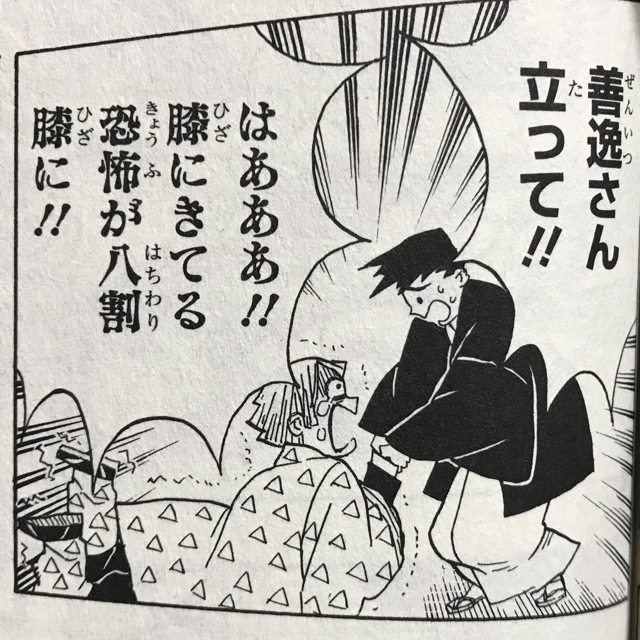Welcome to Kimetsu no Japanese, a site for learning Japanese from a manga Demon Slayer.
Today’s topic
Ch.23 Vol.3
Zenitsu Agatsuma (我妻 善逸)
Reference source : 五峠呼世晴 (2016) 鬼滅の刃3 集英社
膝にきてる 恐怖が八割 膝に!!
It’s in my knees! Eighty percent of my fear in my knees!
Reference source : KOYOHARU GOTOUGE. (2018). Demon Slayer. VIZ Media, LL

How could I make a funny phrase like this?
I love and respect Zenitsu so much as you probably do. He is a terrible coward but has an unbelievable talent and without him Demon Slayer can’t be completed. Nobody couldn’t imagine what would happen next to this scene but I can imagine everyone must have been stunned!!
OK, let’s see a witty remark of weakling-Zenitsu.
Lesson
| JPN | 膝(ひざ)にきてる / 恐怖(きょうふ)が八割(はちわり) / 膝(ひざ)に!! |
| JPN♪ | hiza ni kiteru / kyōhu ga hachiwari / hiza ni |
| ENG | It comes into my knees / Eighty percent of my fear / into my knees |
| WORD | JPN♪ | MEANING |
|---|---|---|
| 膝に | hiza ni | (in)to one’s knees. 膝(ひざ) : knee(s) に(ni) : <postpositional particle>reaching a place, situation |
| きてる | kiteru | to come; properly written as “kiteiru” (Basic form = “Kuru”) |
| 恐怖 | kyohu | fear |
| が | ga | <postpositional particle> a word before “ga” become a subject, this case, “恐怖(fear) |
| 八割 | hachiwari | 80 percent 八(はち hachi):eight 割(わり wari):Japanese original mathematical expression of rate. 1割=1/10 |
Explanation | Inverted structure
This sentence looks simple but it uses an inverted structure.
Normally we can say this phrase in this order;
恐怖が 八割 膝に きてる (kyohu ga hachiwari hizani kiteru)
but as translated in the manga, this order,
膝にきてる 恐怖が八割 膝に
he emphasizes “膝に(hiza ni) = IN MY KNEES”, so he says “hizani” first and ends with “hizani” again.
Changing word order from a basic structure is quite effective to make an accent to a sentence when you want to say something strongly.
Flexibility of order
Japanese grammar is quite flexible as its order, a subject can come late and an object can come first if you want. You can put any word regardless of order, but you need to care about postpositional particles instead.
IT IS EVERYTHING.
For this sentence, I explained に(ni) and が(ga), which means “ni” for “to” and “ga” for no meaning but “ga” determines a word (just before it) as a subject.
I will explain more about postpositional particle in the other articles.
Explanation | To come = “kuru” (kiteru)
Basic form of “kiteru“ is “くる kuru”.
The meaning of “Kuru” is “to come” as explained in the table of ‘LESSON’c. But this word has several meanings and in this case it means “to give a bad influence on something”.
Therefore, what Zenitsu meant in the topic sentence is “eighty percent of my fear has given a bad effect on my knees and I can’t move any more.”
Idioms using “kuru” 1
“Kuru” is also used with other words to make idioms.
When you say “kuru” with a body part, it usually means “give a bad influence on the part”.
| Part | JPN | JPN♪ | MEANING |
|---|---|---|---|
| LEG | 足にくる | ashi ni kuru | to have fatigue or pains in my legs |
| HEAD | お腹にくる | onaka ni kuru | to have loose bowels |
| KIDNEY | 肝臓にくる | kanzo ni kuru | to have a bad condition of kidney (for drinking too much) |
“足にくる(ashi ni kuru)”, we often use this phrase when we are tired for walking too much or you have a pains on your legs for some reasons.
For example, when you see a rough mountain route for climbing, you can say,
“これは 足に くるぞ!” (kore wa ashi ni kuruzo! = It’ll be tough for my legs!)
Idioms using “kuru” 2
Let’s see some more idioms of “kuru” with the other words. These are the phrases that you can’t imagine only by the word.
| JPN | JPN♪ | MEANING |
|---|---|---|
| 頭にくる | atama ni kuru | to get angry |
| ピンとくる | pin to kuru | to have a eureka moment, to have a sudden inspiration by a small hint |
| かちんとくる | kachin to kuru | “it annoyed me” |
That’s all
Today’s simple sentence contained lots of important elements.
Please remember this phrase “hiza ni kiteru!” when your legs get tired or you can’t stand up in horror.
Anyway, in the situation that eighty percent of fear (huge!) is in his knees, Zenitsu did his best, don’t you think so?
Use new phrases for leaning!


Comment